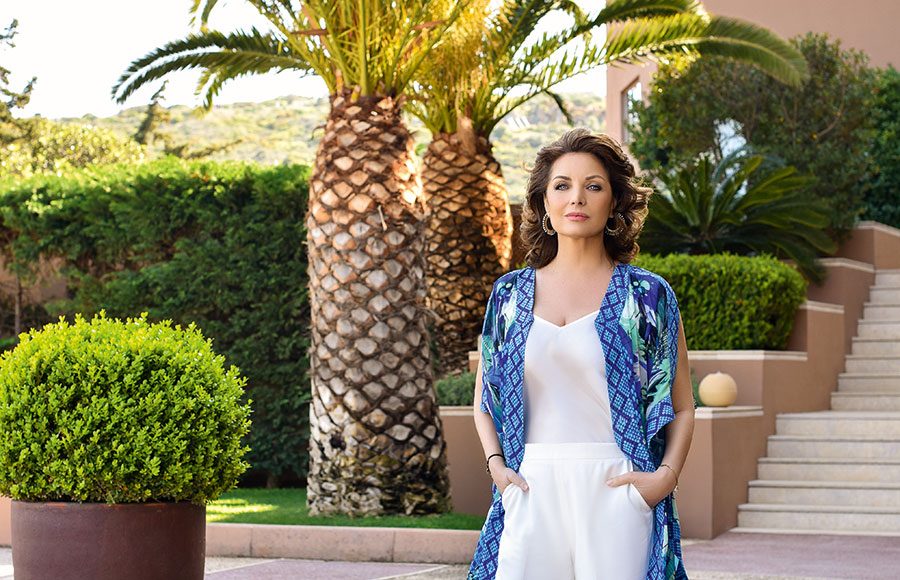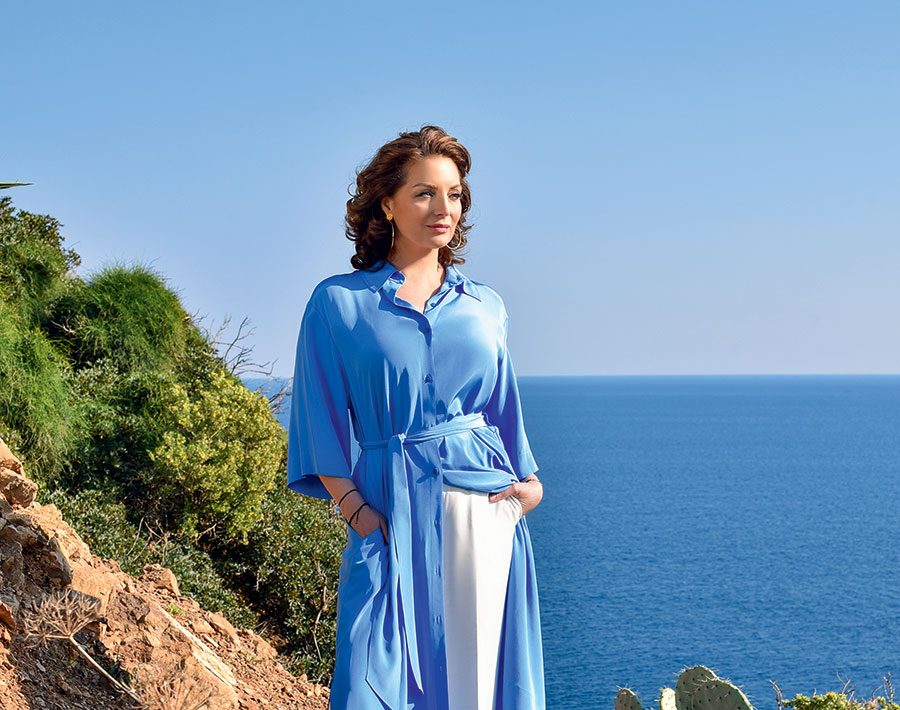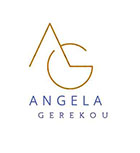As tourism marketing moves from glossy picture-perfect advertising to cater to an eco-conscious, inquisitive and technologically-advanced traveller, Sudha Nair-Iliades speaks to Angela Gerekou, President of the Greek National Tourism Organization on the radical changes in global tourism and Greece’s response to unlocking its tourism potential
Angela Gerekou has donned different hats in her long career in the public eye as an architect, urban planner, model, actress (best remembered for her roles in Magiki Nyhta ,1995 and in the Greek-British production The Girl from Mani ,1986), singer, politician, mother and proud Corfiot. Consistently voted as one of the most beautiful women in Greece, she more than proved her mettle in politics and as a tourism strategist in her stints as Deputy Culture and Tourism Minister in 2009 and later as Deputy Culture and Sports Minister in 2014. Fluent in Italian, English and French, in her role as the President of the Greek National Tourism Organisation, Angela Gerekou hopes to present the contemporary face of Greek tourism through authentic, sustainable experiences to cater to a diverse range of travellers.
You were Greece’s Deputy Culture and Tourism Minister in the midst of Greece’s crippling economic crisis in 2009-2010 and Deputy Culture and Sports Minister in 2014. Now with Greek tourism booming (international arrivals up by 13 percent in the first quarter of 2019), it must be a different challenge to sustain these high levels with new product offerings. How optimistic are you for the future?
During this decade I participated in two government schemes, in the fields of culture and tourism, and we dealt with many issues in a difficult international environment for Greece. Now, as we are heading towards the next decade, I believe the political system has recognized its mistakes and weaknesses and new efforts are being made to respond to the demands of Greek society for prosperity. To meet the challenges that are ahead of us, the Greek National Tourism Organisation and other services involved in the tourism process, must and should promote a tourism model of sustainable development, with a new narrative and projection to the future. We will implement effective policies, rectify the wrong ones, and design new strategies that can guarantee a productive future for the evolution of Greek Tourism into a more qualitative mass tourism destination and develop alternative and thematic tourism products. Both the Greek Government and I are optimistic to meet the new needs of the international tourism agenda.

Angela Gerekou, President of the Greek National Tourism Organisation. Photo Credits: Hello
Greece is having its moment in the spotlight with positive stories and messages coming out of here – from new museums, vibrant creative hubs, luxury investments and fashion shows that showcase our archaeological sites – it has never been a better moment to promote all that this ancient yet contemporary land has to offer. How do you hope to capitalize on this momentum to deliver your vision for Greek tourism?
Moving into the new decade we’re hopeful that the resilience of the Greek spirit will shine through in transitioning from its protracted period of crisis, into a new era of productivity and positive results in every field. This is the main goal of the newly elected government – to have a new, positive story to tell internationally regarding investments and prosperity for all. Promoting Greek creativity through the channels of new technology and international media, we will let the tourism sector in Greece and international creators know that they have the State and especially GNTO on their side. We have the opportunity to make Greece the preferred choice for international visitors. This is our vision and we will make it happen.
The Greek National Tourism Organisation is the country’s ambassador to the whole world and we have intelligent, anthropocentric strategies in place to promote Greece to every corner of the globe
We all agree that Greece has to go beyond its sun-and-sand strategy to make it appealing as a contemporary, modern, 365-day destination.What strategies do you have in place to promote this new image of Greece? What will be the primary focus of GNTO’s new campaigns?
We are already planning our new campaigns for 2020 and also together with the Ministry of Tourism designing a new plan, setting our goals for the next decade. This has never been done in the past, and it is proof that we understand the issue and want to have a new and better image of Greece. As we deal with the modern demands of international visitors, we design a new single agenda of the Greek Tourism product with regional and thematic differentiation, unlocking the potential of Greece’s natural beauty but also the endless possibilities in other areas of tourism. The local communities play a key role in this process because every region of Greece has something diverse to offer and we want to express this distinction.
The “sea and sun” formula has been the country’s asset for many years, and we should not forget that, but we can evolve and upgrade it. Greece can create a high-end tourism market in unison with hotels, attractions, food, services, shopping and the advantage of new technology instruments.
Towards that end, the GNTO and the public sector entities dealing with tourism, can work with private sector businesses on campaigns to drive awareness of the high-end market they are trying to create.
So, to summarize, the mass tourism product can be more qualitative, the high-end tourist market can be upgraded and together with the promotion of alternative and thematic tourism agenda, we can give a new feeling to our campaigns.
What is the profile of the new tourist coming to Greece? What experiences are they looking for?What are the new strategies you have in place to attract these new, millennial travelers? What are the new incoming markets GNTO will be focusing on?
According to most reports, the profile of tourists coming to Greece includes all kinds of tourists, and this diversity is something that we want to sustain. But in recent years, there’s a trend towards more singular experiences, and that doesn’t have to do with how much money a visitor spends in the country. Regardless of their income more people want to experience a unique moment in Greece either with their families, groups of friends, as couples, or even as solo travellers. We want to make millennial travellers, like other visitors, feel at home, and at the same time to live unique experiences that they will narrate when they go back. This is our strategy, and with the means of new technology instruments, we can promote their activities and the experiences gained during their stay in Greece.
Making people’s stays memorable in a positive way can create word-of-mouth referrals via social media and this is an extremely valuable and effective method of creating the market for high-end customers more alluring.
When we design policies for incoming markets, we are aware that traditional markets can and should remain on the top of our efforts in order to keep doing well, and as for new incoming markets we examine reports and research to increase arrivals from places where Greece’s image is good but not so popular. Our campaigns for the next few years will target these countries from Asia and the Middle East, the US and Africa, because as I said before, we want to make Greece the first choice for international visitors.

Tourism has always been a very fragile industry, as the recent Thomas Cook debacle has proven, estimated to affect the Greek tourism industry to the tune of 500 million. How does GNTO and the Ministry of Tourism hope to put a mechanism in place to buffer such shocks?
Tourism is a product that is simultaneously affected by many factors and the over-dependence on big tour operators only adds to the risks. The recent crisis of Thomas Cook is proof of that, and demonstrates the need for diversity in our promotional efforts and reliance on big tour operators. Not just Greece- but the entire international tourism market has been working for many years with an unhealthy dependence on these tour operators, and it’s a reality we have to now confront directly. Designing and promoting promotional policies that target international visitors directly with a specific agenda for sustainable tourism development can make Greece more resilient to that, and to any kind of crisis. We have designed a Mechanism of Crisis Management, with the Ministry of Tourism and other Ministries, to enable us to react immediately to a crisis, and to also be prepared with pre-emptive measures all year long. It must be said that when Thomas Cook announced its bankruptcy, we immediately set up a crisis operating centre at the Ministry of Tourism and very quickly the Greek Government adopted appropriate measures.
One of the risks in Greek tourism has been that of ‘over-tourism.’ How do you balance the fragile sustainability of an island with tourism growth?
Targetting for a sustainable tourism development means that we want to have an increase of the number of visitors, the quality of the product together with the protection of the natural beauty of the Greek environment. Tourism growth in an area doesn’t mean that it also needs to be harmful to the environment and this is the issue of the next decade. We want to improve the infrastructure, respect the environment, and promote this agenda to the actors of the tourism sector and also to our visitors.As the 17 Sustainable Development Goals guide us, we believe that “over-tourism” as an issue can be handled with the necessary policies, because we want to have prosperity and pass it on to the next generations.
Tourism was largely dismissed as a fringe industry in Greece and has only lately been given the importance it so rightly deserved. How do you hope to change that image of tourism in Greece?
Tourism adds a significant amount to Greece’s GDP every year and while tourism is an old product that goes back many decades, it can be much more productive for the country as Greece is blessed with natural beauty and also enjoys a unique location in the planet. As the new administration at GNTO and the Ministry of Tourism, we want to unlock the potential of every region in Greece by promoting activities that embrace all aspects of tourism – nature, culture, gastronomy, sports (extreme sports and high-end activities such as golf), sailing and more!
Greek tourism in numbers
- Greek tourism flows and revenue up 13% in the first quarter of 2019
- Greece was among the world’s leading destinations as demonstrated by growth at Athens Airport up by 16.6% and regional airports stronger by 8.6%.
- The industry’s direct contribution to the country’s GDP is 21.6 billion euros or 11.7% and indirect contribution works out to almost 25% of the GDP
- Tourism attracted 5 billion euros worth of investments
- Tourism employs up to 44% of the workforce
- Greece attracted as much as 33 million visitors in 2019
- An all-time high of 3.8 million tourists was recorded in July 2019 as compared to an all time low of 140.107 persons in February 2013.
- Tourism Revenues in Greece reached an all-time high of 3645 million euros in July 2019
sources: INSETE, National Bank of Greece



